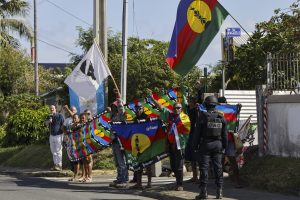The recent unrest in New Caledonia highlights France’s enduring colonial legacy in Asia and shatters its self-ascribed image as a legitimate Pacific power. The Indigenous Kanak people have clearly demonstrated their interest in self-determination and their willingness to fight for independence. Rather than preserving its control of the island by force, Paris should immediately allow a new referendum to replace the illegitimate 2021 vote, which the Kanak boycotted due to the COVID-19 pandemic.
France seems more focused on undermining the majority Kanak population’s influence by empowering French settlers. The Macron administration aims to expand French control over the island by amending the constitution to allow more settlers to vote on local matters, thus diluting Kanak influence. The Kanak people see this legislation as a threat to their long-term political interests and have understandably chosen to resist.
The protests, although violent, are a reaction to the French settlers’ armed militias and military tactics. Conflict between the Kanak people and French settlers is nothing new; violence between the two groups has been a feature of France’s colonial rule since its inception. Calls for independence can be traced back to at least the 1970s. Throughout this colonial history, French settlers have employed policies that structurally marginalize the Kanak, dominating the island’s politics and businesses while relegating the Kanak people to second-class status. This is the context in which France claims New Caledonia has “chosen” to remain a territory.
The current unrest is particularly significant given France’s foreign policy stance on protecting the territorial and sovereign integrity of Ukraine and self-determination of Hong Kong and Taiwan. President Emmanuel Macron’s decision to counter indigenous calls for self-governance in New Caledonia, shortly after criticizing China for its “new imperialism” in the Pacific, is strikingly hypocritical. In terms of France’s broader Indo-Pacific engagement, the strategic implications are profound both for Paris and its Western-aligned allies.
By using force to counter what Macron called an “unprecedented insurrection movement,” France is demonstrating its commitment to continued colonial rule, putting it at direct odds with Asian states where anti-colonial sentiment infuses nationalism. By dismissing indigenous calls for political autonomy and independence, France undermines Asian norms of self-actualization, territorial integrity, and sovereignty. This rejection of self-determination has implications for France’s professed support for Taiwan and Hong Kong.
The Macron administration’s marginalization of New Caledonia’s Kanak people is in direct opposition to regional trends. In Australia, Japan, New Zealand, and Taiwan, politicians and populations are committed to indigenous recognition and reconciliation. It is curious that Canberra and Wellington are not more vocal in their condemnation of France’s approach.
Regional states and institutions, already deeply cynical about Western ideals, given foreign policy exceptionalism on matters like the Ukraine war and Israel’s military operations in Gaza, are not oblivious to these contradictions. In the Pacific, representatives from the Pacific Island Forum and Vanuatu have identified “the unfinished business of decolonization” as the driver behind New Caledonia’s political unrest. The influential Pacific Conference of Churches identified France’s “dehumanization” of the Kanak people as the root cause of the current violence.
In Asia, Indonesian media have widely reported on the New Caledonian independence movement, casting France as a colonizer willing to use military force to preserve its political dominance. Vietnamese commentary similarly identifies unresolved French colonialism as the root cause of New Caledonia’s political unrest. Chinese media are also critical of French double standards toward New Caledonia, particularly on matters of censorship, self-determination, democracy, territorial integrity, and rule of law.
All this points to the fundamental fact that France is not a sustainable Pacific power. Its claim to regional status is based on its refusal to recognize its colonial legacy in Asia and the Pacific and to amend this through post-colonial reconciliation, including the recognition of national independence.
The idea that any European state has the right to maintain overseas “territories” in 2024 is a grotesque miscarriage of justice that needs immediate remedy. Otherwise, the notion that any Western state is committed to a “rules-based order” is nothing more than lip service to ongoing exploitation.

































